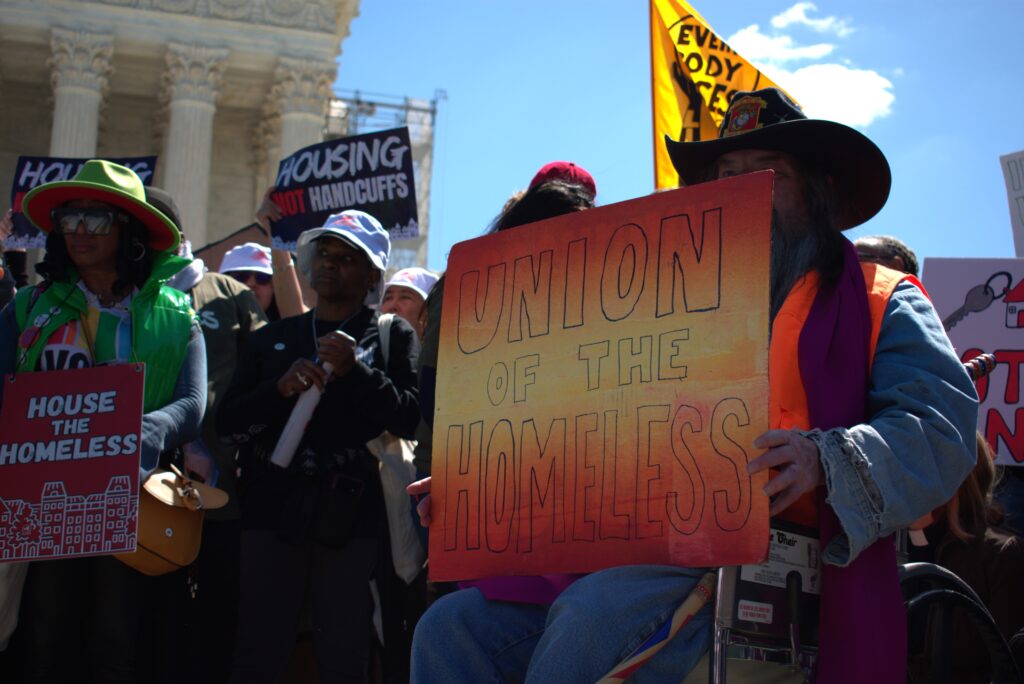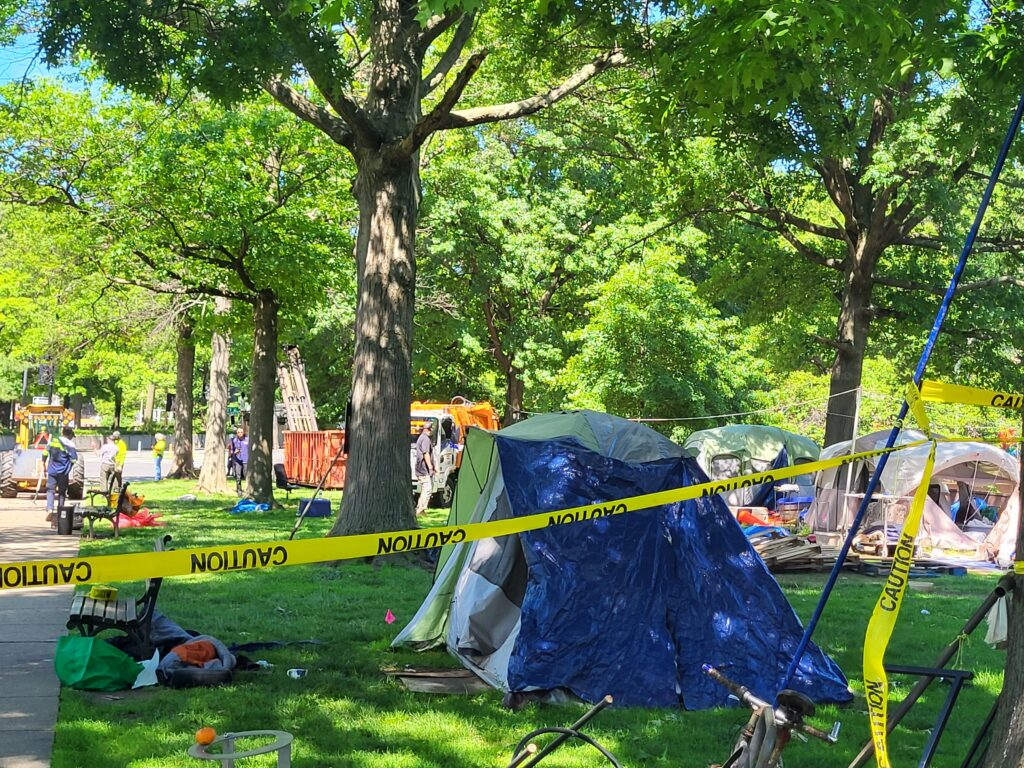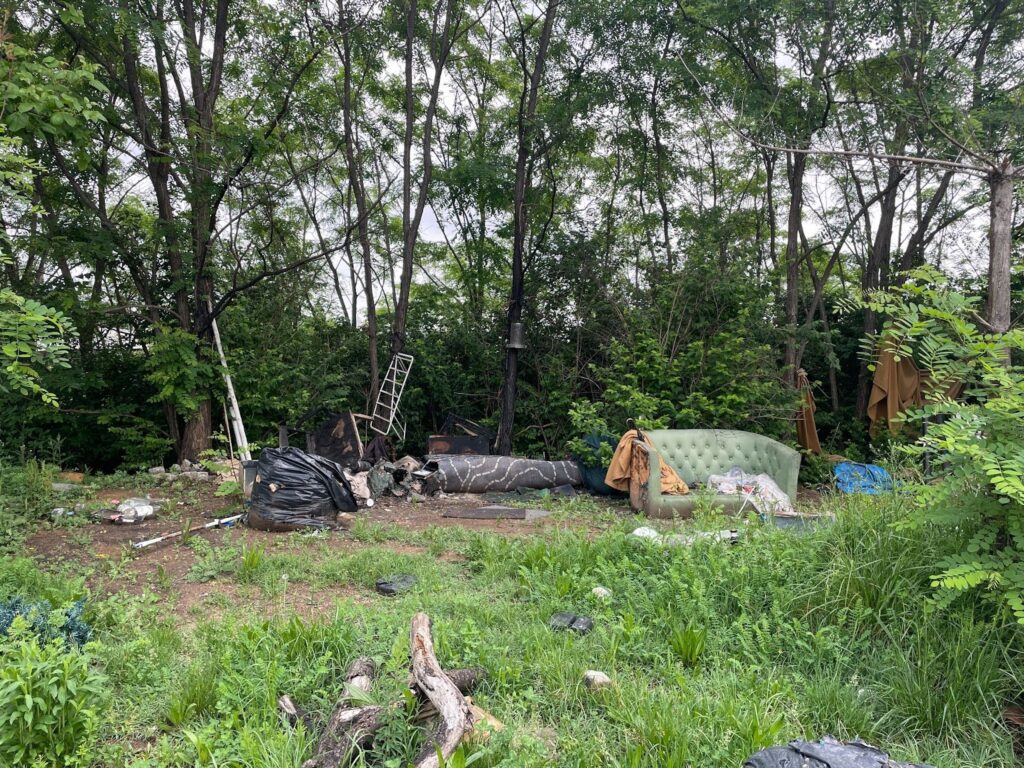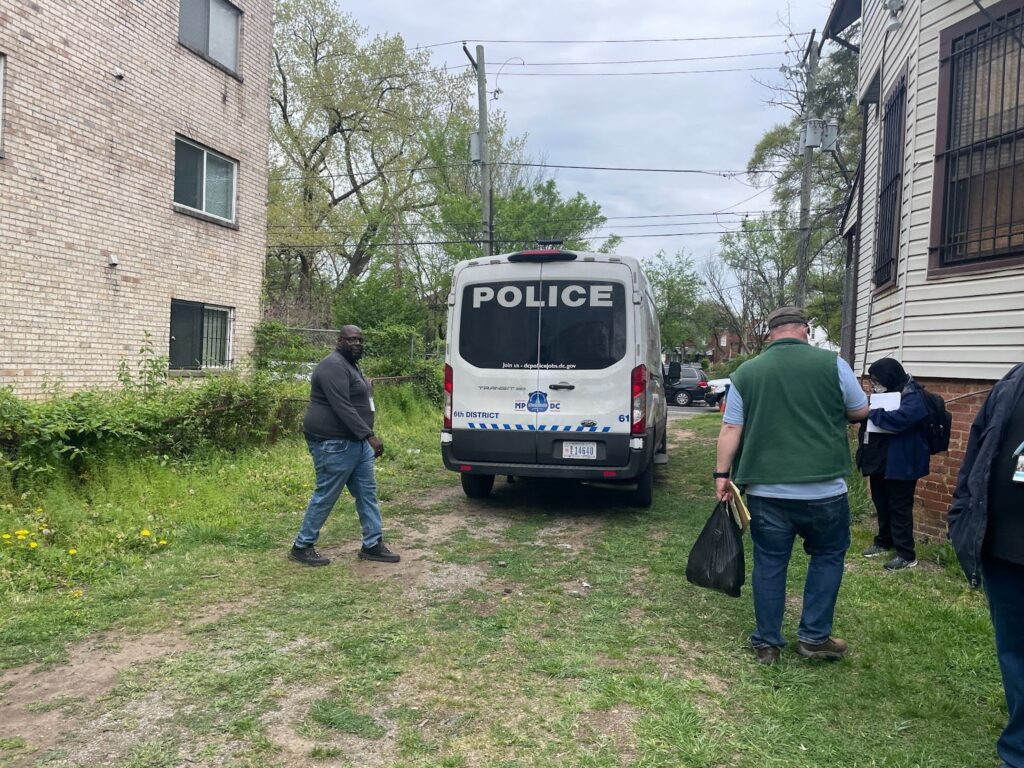On April 22, the U.S. Supreme Court heard oral arguments in Grants Pass v. Johnson, widely regarded as the most consequential case concerning homelessness in decades.
At issue: can cities punish people experiencing homelessness for sleeping on public property when there is no alternative shelter available?
The case comes amidst both surging homelessness rates and intensifying criminalization of unhoused people. The Department of Housing and Urban Development (HUD) estimates that a record 653,104 people experienced homelessness on a single night in 2023. Meanwhile, local governments –– facing political pressure and overburdened social services –– are increasingly clearing tent encampments, despite the costs and health risks for encampment residents. In D.C., encampment closures have spiked since 2022. U.S. cities have instituted a bevy of laws restricting unsheltered homelessness in recent years, per a National Homelessness Law Center (NHLC) report. By 2019, 51% of surveyed cities had implemented at least one law limiting sleeping in public, a 50% increase since 2006.
Many legal experts predict that, no matter the outcome, the court’s ruling will have sweeping ramifications both for the rights of unhoused people and for the approaches local governments take to address homelessness in their communities. The legal arguments made by the city of Grants Pass in Oregon, by the Department of Justice, and by plaintiffs experiencing homelessness diverge widely. Here’s what you need to know.
Background
The case dates back to 2018, when three unhoused people sued Grants Pass for its enforcement of an ordinance that bans sleeping in public spaces and levies stiff penalties for violators. The lead plaintiff, Debra Blake, who died before the case reached the Supreme Court, accrued over $5,000 in fines –– which start at $295, nearly double to $537.50 when left unpaid, and can be elevated to jail time after two offenses. Critics argue the statute renders it functionally impossible for people experiencing homelessness to exist in the city without being subject to prosecution; despite being home to approximately 600 people experiencing homelessness, the municipality has only 130 shelter beds (provided by a religious organization with high barriers to entry). Local lawmakers have even hinted the law was intended to criminalize homelessness, with the city council president saying the goal was to “make it uncomfortable enough for [people experiencing homelessness] in our city so they will want to move on down the road,” according to Vox.
In 2022, the case reached the Ninth Circuit Court of Appeals, which upheld its 2018 ruling in a similar case, Martin v. Boise, that unhoused people cannot be punished for sleeping in public when no other shelter is available. In the Grants Pass case, the Ninth Circuit found the ordinance violated the residents’ constitutional protection from cruel and unusual punishment, penalizing individuals “based on their status of being involuntarily homeless.”
The concept of “status crimes,” which criminalize a state of being, rests on avidly debated Supreme Court precedence. In its 1962 ruling in Robinson v. California, the court ruled the state of California could not make it illegal to be addicted to drugs, but could punish the use of drugs. In other words, it is unconstitutional to punish an “involuntary status,” like being an alcoholic, outright; however, laws can limit behaviors associated with that status, like drinking alcohol in a public space. The distinction between punishing a status and punishing conduct associated with that status played a central role in the oral arguments heard by the court in Grants Pass v. Johnson.
Oral Arguments: Grants Pass
Theane Evangelis, the lawyer arguing on behalf of Grants Pass, made two central claims before the court. First, Evangelis argued the Ninth Circuit was wrong to use the Eighth Amendment to protect conduct related to the status of homelessness. In the city’s view, under Robinson, laws must be allowed to prevent some actions, like sleeping outside, even if those actions are definitional elements of a status, like homelessness.
The court’s liberal minority objected to this characterization. Justice Elena Kagan pointed out that sleeping is “a biological necessity” that, like breathing, is universally necessary to stay alive and thus different from the use of drugs punishable under Robinson. The city’s ordinance criminalizes the mere existence of people experiencing unsheltered homelessness, who cannot, by definition, sleep anywhere except in public spaces, she concluded.
However, several conservative justices appeared amenable to the city’s argument, disagreeing with the idea the plaintiffs were preemptively protected from prosecution when engaging in banned behavior, even if it was fundamentally linked to their homelessness. Justices Brett Kavanaugh and Neil Gorsuch suggested unhoused people charged under the ordinance should instead be required to make a “necessity defense,” taking their case to a local court to argue sleeping in public was unavoidable.
This could present practical concerns, Maria Foscarinis, the founder of the NHLC and an adjunct professor at Columbia Law School, argued in an interview with Street Sense. She called this notion “absurd,” noting this approach “puts the burden on” people experiencing homelessness by requiring them to seek out legal representation and prove their vulnerability.
Second, the city claimed the Ninth Circuit’s ruling in Martin inappropriately limited the tactics cities could use to address unsheltered homelessness. Justice Amy Coney Barrett shared this concern, asking whether cities would still be able to restrict the use of fires or tents if the court ruled in favor of Johnson.
Liberal justices objected to considering this line of thought. According to Kirsten Anderson of the Southern Poverty Law Center, these broader questions are “not at issue in this case, where we have a very extreme ordinance that bans people from sleeping with as little as a blanket… at all places and at all times in the city.”
Broadly, the city argued homelessness is a complex public policy issue better left to local policymakers, maintaining that “[c]ourts not only lack the legal authority, but also the practical competence to serve as ‘homelessness policy czars.’” Justice John Roberts appeared sympathetic to this contention, pointedly asking an opposing lawyer why “these nine people” are best situated to “weigh those policy judgments.” On the other hand, Justice Sonia Sotomayor repeatedly questioned what would happen to unhoused people should the court allow strict criminalization nationwide. If every town “lacks compassion,” she asked, “[w]here are they supposed to sleep? Are they supposed to kill themselves, not sleeping?”
Building on Sotomayor’s point, advocates argued banning encampments will not solve the issue of homelessness.“Homelessness has grown because more and more hardworking people struggle to pay rent, not because we lack ways to punish people sleeping outside,” Jesse Rabinowitz of the NHLC said. A ruling limiting the criminalization of homelessness, he said, would encourage cities to focus on tenable and evidence-based interventions to prevent homelessness.
“The only solution to homelessness is more housing and supportive services,” said Sarah Saadian, senior vice president of public policy and field organizing at the National Low Income Housing Coalition (NLIHC). “[I]f folks are really wanting to solve this problem, that’s where they should focus, not on arrests and fines.”
Oral Arguments: Department of Justice
The Department of Justice (DOJ) also weighed in during oral arguments, staking out a narrow middle ground. Edwin Kneedler, the deputy United States solicitor general, argued that, while the Ninth Circuit’s ruling in Martin v. Boise is largely sound, the court made a mistake by not requiring individual assessments of whether individuals were acting involuntarily. The DOJ argued the Eighth Amendment protection only applies if someone truly has nowhere else to sleep and that, as a result, “meaningful inquiry into the particular circumstances of the individuals to whom the challenged ordinances may be applied” is required.
In practice, this would entail officers assessing whether a person sleeping outside could ostensibly be housed –– either by friends or family or in a shelter within the municipality (or nearby, as Roberts suggested). However, advocates cautioned this would quickly become tricky. Many shelters have policies capping the number of days people can remain in the facility, whether they can stay with a partner, or whether they can bring a pet. In other words, Anderson summarized, while a shelter bed may be technically available, it may not be “physically … or legally accessible to [someone] because of [these] limits.”
Furthermore, Foscarinis and Anderson both pointed out that the number of people experiencing homelessness routinely outpaces the number of available shelter beds in cities across the country, making it unnecessary to question each person. “What,” Anderson asked, “is the purpose of an individualized inquiry in that situation?” In general, critics argued, sleeping in public spaces is the last resort and on its face suggests that someone has no suitable alternatives. “The idea that people choose to be homeless,” Rabinowitz concluded, “is just not true.”
Oral Arguments: Johnson
Kelsi Corkran, Supreme Court director at the Institute for Constitutional Advocacy and Protection, laid out two claims on behalf of the plaintiffs experiencing homelessness.
First, Corkran argued that the Grants Pass ordinance is unconstitutional because it effectively punishes a status, even if it does not name it. By banning sleeping in public, she noted, the statute prohibits a universal human function but punishes only those who have no access to a private space. “Sleeping outside,” Corkran stated, is functionally “part of the definition of homelessness.” Thus the question before the court, she argued, is “whether there’s any meaningful difference between a law that says being homeless is punishable and a law that says being homeless while breathing or sleeping or blinking is punishable.” Because both versions “make people with a status [of homelessness] endlessly and unavoidably punishable if they don’t leave Grants Pass,” Corkran argued, “[t]he answer is no.”
In response, some justices questioned whether the status of homelessness is defined too broadly. For instance, Roberts asked whether, unlike a lifelong struggle with addiction under Robinson, “the status of homelessness can change from one time to another” and become too fluid to define. Getting temporary accommodation at a friend’s home or in a shelter, Corkran responded, does not mean that a person is no longer experiencing homelessness, which is defined under HUD guidelines as lacking “a fixed, regular, adequate night-time address.” During questioning, Roberts appeared to confuse accessing shelter with ending an episode of homelessness. Gaining “shelter itself does not end homelessness,” Anderson clarified. “Homelessness ends with a home.”
Second, Corkran argued that even without anti-sleeping laws, cities retain “an abundance of tools to address homelessness.” Contrary to claims filed by local governments in support of Grants Pass, she noted, cities maintain the ability to clear encampments and enforce a range of public safety and health regulations. “The only tool the city wants that it doesn’t have,” Corkran concluded, “is authority to impose a 24/7, city-wide sleeping ban that forces its homeless residents to either move to another jurisdiction or face endless punishment.”
Advocates agreed, adding that cities also maintain the ability to invest in long-term solutions. Amanda Aykanian, an assistant professor in the School of Social Work at the University at Buffalo told Street Sense that, while cities are overwhelmed and working to “get rid of the problem,” they could instead prevent homelessness by investing in “affordable housing, … living wage jobs, … [and] ramping up … the service offerings that we have.”
What does this mean for the future?
In general, the direction of the national conversation about homelessness is discouraging to advocates hoping to see ambitious solutions, rather than penalties and fines, take center stage. “I think it demonstrates how far off base we are when it comes to having serious solutions to address homelessness,” Anderson said.
Advocates and legal experts agree that the case is likely to have far-reaching consequences no matter what route the court takes. Should the justices rule in favor of Grants Pass, Foscarinis predicted, “[i]t’ll be an open invitation to cities to criminalize … their homeless residents.” Akanyian noted that this extends beyond ordinances banning sleeping; laws prohibiting “loitering, panhandling, sitting, blocking sidewalks,” and other behaviors target unhoused people across the nation and could be bolstered by a ruling against the unhoused plaintiffs.
Additionally, Rabinowitz argued that giving a green light to the criminalization of homelessness could exacerbate racial injustice. “[P]eople of color are more likely to be arrested, stopped, fined, jailed, [and] shot by police,” he said. “This approach … increases people’s contact with the police in ways that could be harmful and, indeed, deadly.”
But if the court decides in favor of the residents, Foscarinis said, there is room for hope. “I think what that will do is just reinforce to cities … nationwide that they have to come up with some other response to homelessness” that centers housing rather than handcuffs. “And that,” she concluded “would be a good thing.”
A ruling is expected sometime in late June.







